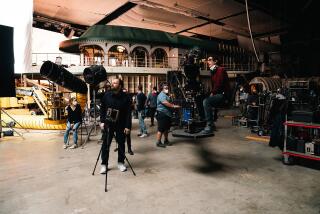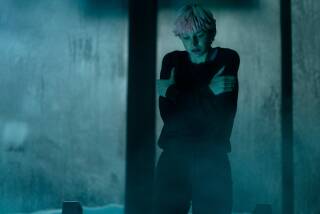Hollywood is hot for Iceland
When filmmaker Darren Aronofsky started scouting locations for his biblical flood epic, “Noah,” he had two potentially competing needs.
The landscapes on which he would shoot exteriors needed at first to look like an uninhabitable wasteland, and, after the deluge, a new garden of Eden, where Noah, his family and his ark of animals could begin to repopulate the earth.
The writer-director’s production team considered Death Valley, deserts in Mexico and the Canary Islands. But when they visited Iceland, “Noah” found its port of call.
“The landscapes are surreal — practically of another world,” said Scott Franklin, Aronofsky’s longtime producing partner.
PHOTOS: 10 controversial films based on religion
Thanks to a generous production rebate, eager film crews and a striking geography of dramatic black sands, glaciers and lava fields, Hollywood is warming up to Iceland as never before, turning the remote Nordic island nation into an unlikely hot spot for film and television production.
In the last two years alone, the country with a population of just 325,000 has seen a record level of production activity.
In 2012, Iceland hosted the popular TV series “Game of Thrones” as well as the movies “Oblivion,” “Thor: The Dark World,” “The Secret Life of Walter Mitty” and “Noah,” the Paramount Pictures movie that debuted last weekend. The science-fiction movies “Star Trek Into Darkness” and “After Earth” also shot scenes there.
Last year, Iceland also attracted crews from the next “Transformers” movie, Andy and Lana Wachowski’s film “Jupiter Ascending” and Christopher Nolan’s “Interstellar,” which also has been filming in Los Angeles and marked Nolan’s second stint in Iceland. (His 2005 “Batman Begins” also shot there.)
“We’ve been quite busy these past two years,” Icelandic Film Commissioner Einar Tomasson said in an interview in Los Angeles, where he was attending the annual Locations Show hosted by the Assn. of Film Commissioners International.
ON LOCATION: Where the cameras roll
Tomasson said he had been meeting with executives at most of the major studios to drum up even more business.
Production in Iceland ramped up after 2009, when the country boosted its film rebate from 14% to 20%. Now, a film that spends $100 million in the country can get back $20 million, once filming wraps, in the form of a rebate from the government.
Aside from a brief lull in activity in 2010, after a volcanic eruption scared off production, filmmakers flocked to the country the following year. They were led by director Ridley Scott, who used Europe’s biggest waterfall, northern Iceland’s Dettifoss, to replicate a prehistoric, extraterrestrial landscape for his sci-fi movie “Prometheus.”
To be sure, some of Iceland’s film rivals, including Canada, Britain, Australia and New Zealand, offer higher incentives to lure the film industry.
But the country’s natural assets are a big draw, offering a wide range of locations and topography that for many moviegoers are fresh and unfamiliar.
“We’re a small nation but a big country — we have easy access to very beautiful locations,” Tomasson said. “We sometimes say before God created the rest of the world, he was practicing in Iceland.”
PHOTOS: Religious movies at the box office
Iceland’s versatile landscape, which includes black sand deserts and snow-capped mountains, has allowed it to represent many other locations, including alien planets, the Himalayas, Siberia, Minnesota, Greenland, Scandinavia and even a Pacific Island.
A glossy brochure published by the country’s film commission includes testimonials from Hollywood luminaries, including Scott, Joe Kosinski (“Oblivion”) and Clint Eastwood.
On the Reykjanes peninsula, close to the international airport and the capital, Reykjavik, Eastwood found the ideal replica for the black sands of Iwo Jima for his 2006 epic film, “Flags of our Fathers,” where he recreated one of the major battles of World War II.
For “Noah,” filmmakers behind the $130-million production traveled from New York, where an interior and exterior ark were built, to Iceland. The crew filmed for five weeks in 2012, mainly in a black sands area in the southern part of the country near Reykjavik.
Thanks to the series of movies that have recently shot on the island, there are ample crews, Franklin said.
“The people are fantastic,” he said. “I’d go back there in a minute.”
PHOTOS: Box office top 10 of 2013 | Biggest flops of 2013
But “Noah” faced one Icelandic challenge: finding clear skies.
“We were always chasing the weather,” Franklin said. “We would be shooting a scene of Noah and his family walking through desolate lands, and then there’s a rain cloud. You can’t really have storm clouds before Noah learns there is going to be a flood.”
Nature provided other natural advantages, though. Because they were filming so far in the north, the “Noah” team had almost limitless daylight — as much as 22 hours a day.
And the “golden hour,” when low, warm sunlight at sunrise and sunset is considered the most beautiful and cinematic, would last for as long as three hours, rather than the 15 minutes filmmakers might enjoy in California.
“The sunsets and sunrises,” Franklin said, “were unbelievable.”
More to Read
From the Oscars to the Emmys.
Get the Envelope newsletter for exclusive awards season coverage, behind-the-scenes stories from the Envelope podcast and columnist Glenn Whipp’s must-read analysis.
You may occasionally receive promotional content from the Los Angeles Times.












